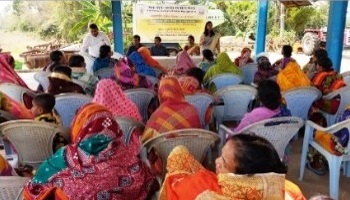On-Farm
Technology Dissemination (including Wastewater Management, Water Policy and
Governance) act as the window of ICAR-Indian Institute of Water Management. The
advanced water management technologies developed, and water policy guidelines
developed by the Institute are demonstrated/transferred to the farmers and
other stakeholders through this window to improve the income and livelihood of
the farmers. The share of freshwater towards agriculture is declining day by
day on the other hand the poor quality water is growing day by day. About 70
per cent of the surface water resources and large proportions of groundwater
reserves have been contaminated due to indiscriminate discharge of wastewater
from the industry, agriculture, and household sectors, which contain biological
as well as toxic organic and inorganic pollutants. Groundwater is also polluted
due to point and nonpoint source pollution. In some areas, the groundwater is
not of the desired quality due to geogenic elements. Wastewater management
research addresses these issues to maintain environmental and human health.
Meeting the challenge of producing 350 million
tonnes of food grain production by 2050 against the backdrop of dwindling
natural resources and climate change scenario,Â
is a daunting task that requires capacity-building, policy reforms and
the formation of partnerships with stakeholders. The mechanisms for linking
front-end activities of the agricultural supply chain with back-end activities
of farm production have been taken up on a priority basis. Public-private
partnership is strengthened for the generation and dissemination of scientific
water management technologies. The poor water quality further strain the
availability of freshwater for various uses. The quality of water has become a
serious problem in surface water as well as groundwater. Water quality issues,
technologies to recycle wastewater and policy guidelines for safe irrigation
are the need of the hour.Â
- A district-wise scenario of irrigation, agriculture, livelihood and poverty was assessed with the help of some indices.
- Common property water resources (CPWR), institutional arrangements and linkage mechanisms for irrigation management in Orissa, spatial and temporal investment patterns in irrigation development and its impact on Indian agriculture were reviewed.
- Capacity building, partnership and linkages are the need of the hour. Links between Irrigation, agriculture and living scenarios in eastern Indian states were established.
- The impact of Technologies on the farming and livelihood of farmers was assessed.
- Water users group dynamics and mobilization for participatory irrigation management, participatory water management and integrated farming in canal command were evaluated.
- The water-food security scenario for 2025 of agroecological region 12 of India was analysed.
- Socioeconomic and resource profiles of Chandrasekharpur, Sogar Bilaikani and Ainlatunga villages were analysed.
- Policy Options for sustainable development of groundwater resources in Odisha.
- WQI to monitor water quality for irrigation and potable use was developed.
- The impact of Urban Wastewater Irrigation on Soil and Crops was analysed.
- Reuse of Industrial Effluent water-Prospect and Opportunities in Agricultural Perspectives was studied.
- Designed and Developed a small-scale filter for reducing contaminants in poor-quality water at the farmers’ level for safe irrigation in periurban areas.
- Developed biological filter for safe wastewater irrigation exploiting microbial bioremediation trait.
- Developed eco-friendly wastewater treatment for re-use in agri-sectors: Lab to Land Initiative.
In-House Research Projects
- Piloting Water Management Technologies for Enhancing Farm Productivity and Income
- Development of Package and Practices for Reducing Hexavalent Chromium in Soil Plant ContinuumÂ
- Adoption and Impact of Micro-Irrigation in India with Emphasis on Community-Scale Micro IrrigationÂ
- Crop Planning under Climate Change Scenario in Mahanadi and Godavari basinÂ
- Technological Options and Policy Guidelines for Risk Management in Water QualityÂ
- Partial Factor Productivity and Efficiency of Groundwater Use in Eastern India
- Enhancing Water and Livelihoods Security and Improving Water Productivity in Tribal Dominated Paddy Rainfed Agro-ecosystem of Odisha (Farmer’s FIRST Program)
Externally Funded Projects
- Dissemination of scientific agricultural water management technologies and impact evaluation
- Imparting training and developing skills of farmers, officials from Government and Non-Government Organisation and other stakeholders of the country on agricultural water management aspectsÂ
- Developing Students with advanced water management technologies using advanced tools like remote sensing, GIS, IoT, Artificial Intelligence and Machine Learning.
- Connecting farmers over the country through WhatsApp, and virtual platforms like Zoom, Google Meet etc. to provide immediate solutions to their problems in their day-to-day activity

